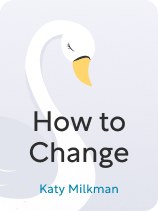

This article is an excerpt from the Shortform book guide to "How to Change" by Katy Milkman. Shortform has the world's best summaries and analyses of books you should be reading.
Like this article? Sign up for a free trial here.
How can you benefit from starting fresh? What opportunities come with a fresh start?
Starting fresh gives you the chance to reevaluate your priorities and establish new habits and behaviors. There are many kinds of new beginnings that offer good opportunities for starting fresh, and knowing how to recognize them can help you take charge of your life.
Read on to learn how to take advantage of new beginnings and start fresh in a meaningful way.
How New Beginnings Create Room for Change
The best time to change a behavior is when you’re starting fresh in a larger way. Think of these moments as “new beginnings.” Put simply, a new beginning comes when a new date, event, or physical change offers you the chance to begin again.
New beginnings work because we think of our lives as narratives or stories rather than as continuous experiences. So when a chapter or phase of your life ends, that feeling that you’re turning a new page helps you to make a change. Psychologically, you feel distanced from past failures and unhelpful labels you might be carrying (“I’m a loser; I can’t change”) when a substantial change happens in your life.
(Shortform note: Even when circumstances don’t present you with a built-in change, thinking of your life as a story can give you a way to understand and move forward from the past, thereby creating a new beginning for yourself. For this reason, some writers approach the craft of memoir writing as something akin to therapy because it allows these writers to clarify and find peace with difficult or complex life stories. Relatedly, Jordan Peterson recommends in Beyond Order that you can intentionally process painful memories or past events in writing as a way to heal and move forward. Again, this can help you create that psychological distance that is key to why new beginnings facilitate effective behavior change.)
There are three types of new beginnings:
- Time-based beginnings are when a symbolically motivating date—such as your birthday, the first day of spring, or New Year’s—rolls around. Research shows that change efforts begun on these days succeed more often.
- Event-based beginnings are when a major change to your circumstances, such as having a baby or changing jobs, forces you into a new mindset and spurs you to start fresh. With that changed perspective, you can approach a challenge from new angles.
- Location-based beginnings come when you move, whether it’s just across your home or across the whole country. These work because shaking up your physical surroundings disrupts ossified habits, making way for new ones to form.
On the other hand, new beginnings don’t help if you’ve already established a good routine. So when you’re already happy with the way things are going in your life, watch out for major events or changes to your circumstances—they might negatively impact the groove you’ve gotten into.
| New Beginnings Aren’t a Magic Pill for Change The “fresh start” effect is valuable because turning a new page helps us to “reset” mentally and improve our performance on subsequent attempts to achieve a goal. Fresh starts have a number of benefits: They can help you move on from past regrets, overcome patterns of rumination, reframe your goals, and find fresh motivation. However, fresh starts aren’t a panacea. For instance, research shows that 90% of New Year’s Resolutions, a common way people try to start fresh, fail within a few months. This may be because the cultural event of making resolutions prompts people to think too ambitiously or to feel obligated to change even if they aren’t ready. Note then that fresh starts may work better if they’re meaningful to you. Similarly, changes in location can provide an opportunity for behavior change, but there’s no guarantee that the new location will facilitate positive behavior change. For instance, moving across the world to work in a new country will change a number of things, including the language spoken, the food and how people eat, and socialization customs. All of these things provide opportunities to learn new ways of behaving, but all could also prove challenging or problematic—for instance, you might struggle to learn the language and thereby have increased stress throughout your everyday life. And again, big events may not universally provide great opportunities to start fresh. Consider that birth and death, two of life’s central events, can both lead to severe forms of depression that may negatively impact your habits and lifestyle in the near-term. In the end, remember that fresh starts can be great times to start over but that you don’t need to always rush into an effort to change. Instead, try to navigate these page-turning opportunities in a way that feels healthy and right to you—and that might not always be using them to change. |
You can use new beginnings to help other people change their behaviors by simply initiating change efforts on new, fresh dates. For instance, you might put word out that you’re starting an office initiative to go paperless for the environment on the first day of spring. That symbolically powerful date (and its connotations as an important day in the natural calendar) will help influence people to give change a real try.
(Shortform note: To further enhance a collective effort at behavior change—such as an office-wide initiative to use a virtual coworking space—consider that you can offer a choice that influences how people relate to the change. In Nudge, Richard H. Thaler and Cass R. Sunstein contend that because how someone presents a choice affects the choice we make, we ought to frame choices in a way that influences us all toward the common good—they call such choices nudges. A nudge that would work above would be to make going paperless the default, thereby making it require more effort not to go along with the office-wide behavior change.)

———End of Preview———
Like what you just read? Read the rest of the world's best book summary and analysis of Katy Milkman's "How to Change" at Shortform.
Here's what you'll find in our full How to Change summary:
- An evidence-based approach to creating lasting change
- How to overcome common human failings, such as procrastination
- When the best time to enact changes in your life is






